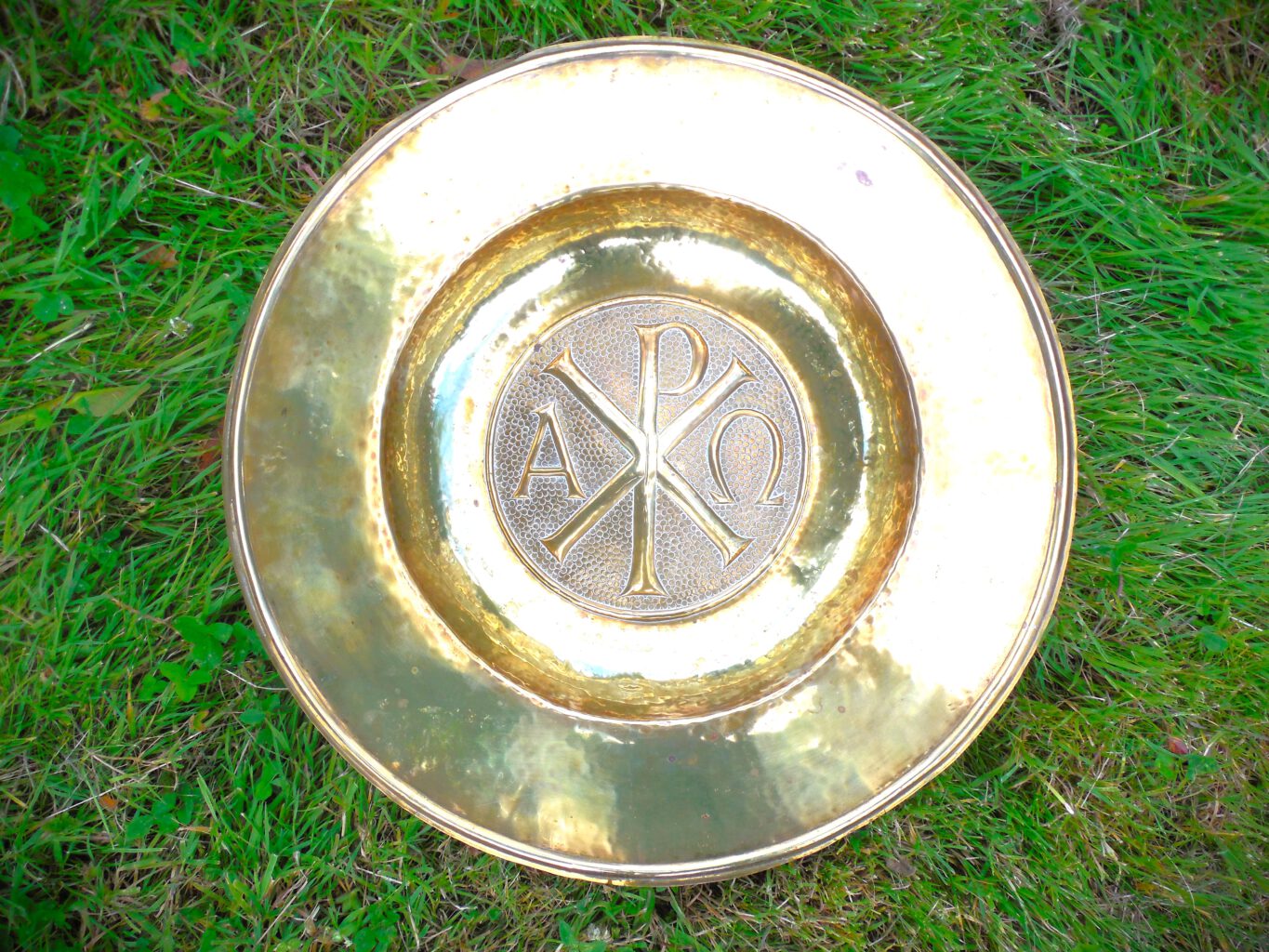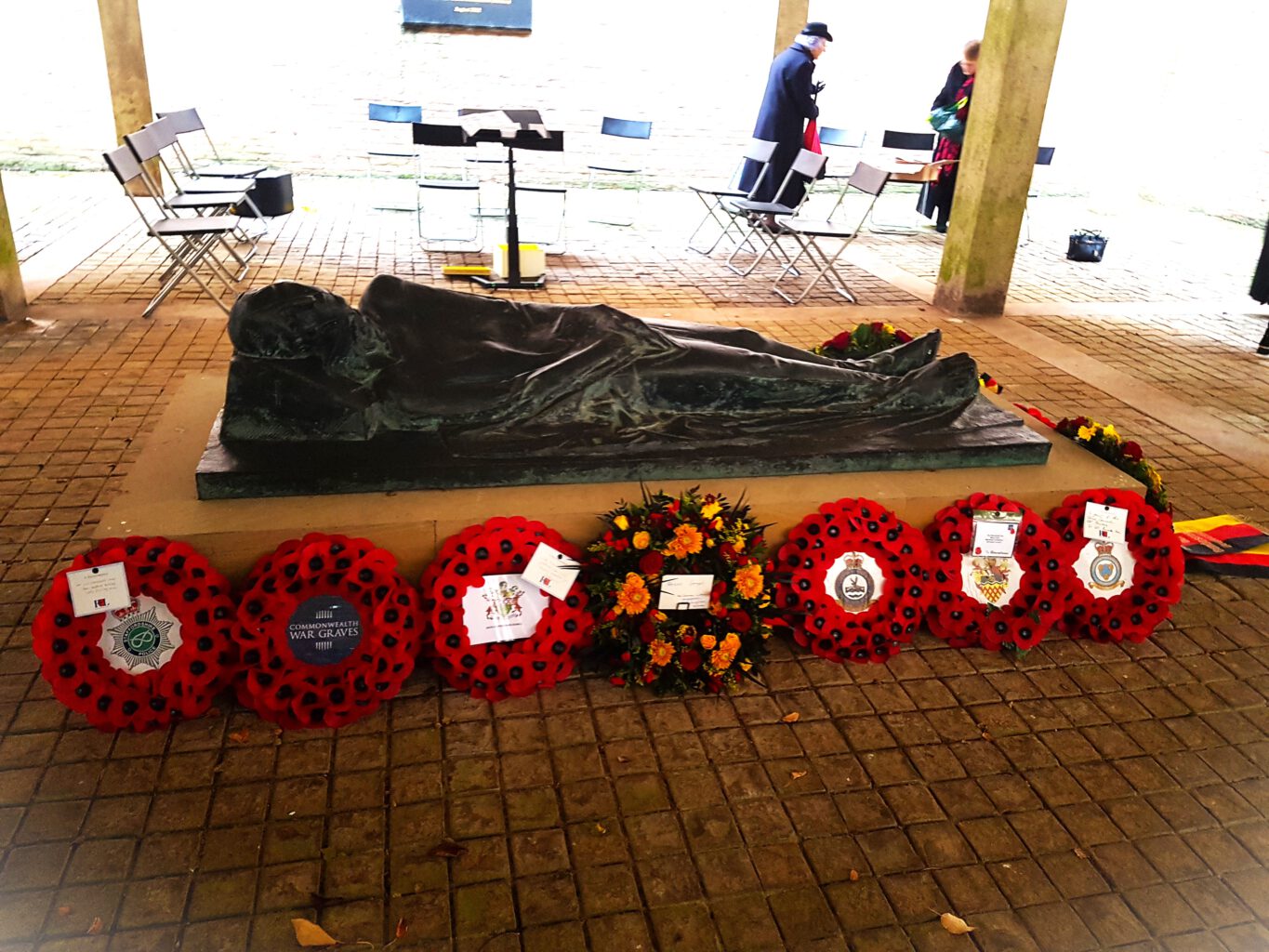
Jetzt habe ich als Reisepfarrer endlich auch eine Reise-Krippe. Ich habe sie mir selbst aus einem Karton gebastelt. Von unserem Meerschweinchen habe ich mir etwas Stroh für das Dach geliehen. Diese Reise-Krippe wird am Heiligen Abend in der St. Martin’s Church im City Centre von Birmingham und in der Cotham Parish Church in Bristol stehen. Da werden wir dann jeweils in der Christvesper gemeinsam die Figuren hineinstellen: Maria, Josef und das Jesuskind, Hirten, Könige, Ochs und Esel und einen Engel, der über der Krippe wacht. Die Figuren habe ich als Scherenschnitte gefunden und ausgedruckt. Die ganze Ausstattung ist also ziemlich einfach und eher symbolisch. Es gibt auch nur jeweils einen Hirten und einen König, weil sonst der Platz nicht reichen würde.
Natürlich gibt es viel schönere Krippen. Meine Krippe ist eher improvisiert, aber vielleicht gerade deshalb ein „Hingucker“. So ein neuer Blick auf die Krippe kann uns helfen, das Wesentliche daran wieder zu entdecken, denn die Krippe hat eine Botschaft. Schon die verschiedenen Figuren sind nämlich nicht selbstverständlich. Vor allem, dass sie dort an der Krippe alle zusammenkommen. Im normalen Leben wären sich diese Menschen schon damals wahrscheinlich nie begegnet. So waren Hirten vor 2000 Jahren die Ärmsten der Armen. Solche Leute wollte wohl eigentlich niemand in seinem Haus haben. Sie waren praktisch obdachlos und für ein Handgeld engagiert, um die Tiere zu bewachen. Manchmal waren sie zwielichtige Gestalten. Aber diese Ärmsten der Armen sind an der Krippe willkommen. Ganz im Gegensatz dazu die Könige oder Weisen aus dem Morgenland. Da gilt schließlich heute noch: Ein König steht für die Elite, für die High Society. Dass sie mit ihren wertvollen Geschenken zur Krippe kommen, ist natürlich wunderbar. Aber am wunderbarsten ist, dass sich alle diese verschiedenen Menschen dort treffen. Alle sind willkommen und niemand wird ausgeschlossen, egal ob arm oder reich, angesehen oder am Rand der Gesellschaft. Für uns ist es heute vielleicht nicht mehr so auffällig, weil wir an das Bild gewöhnt sind, aber sogar die Tiere sind willkommen. Ochs und Esel dürfen als Vertreter der Tiere bei der Krippe sein. Alles Leben auf dieser Erde hat seinen Platz an der Krippe. Alle können zu Gott kommen. Allen leuchtet der Stern auf dem Weg zur Krippe. Allen gilt die Botschaft der Engel: Fürchtet euch nicht! Wir alle dürfen zu diesem Kind kommen. Egal ob fröhlich oder traurig, mutig oder ängstlich. Egal ob reich oder arm. Egal ob groß oder klein. Egal ob mit Freunden und Familie oder allein. Wo gibt es das eigentlich sonst bereits in unserer Welt, in der Menschen meistens einen Pass brauchen, nur um von einem Land ins andere zu kommen, oder erst einmal bestimmte Kriterien erfüllen müssen, um dazu zu gehören? Hier, an der Krippe, bei Gott sind alle willkommen. Ehre sei Gott in der Höhe! Halleluja! Alle dürfen zur Krippe kommen. Gottes Einladung gilt allen, egal welcher Hautfarbe, welcher Nationalität, egal ob reich oder arm, jung oder alt. Aber sehen wir das auch immer so? Manchmal brauchen wir vielleicht einen neuen Blick, der uns dafür wieder die Augen öffnet.
Mir fällt dazu die Geschichte einer Pfarrkollegin ein. Sie hatte eine sehr schöne Krippe, die schon lange in der Familie vererbt war. In den Tagen vor Weihnachten wurde diese Krippe immer im Wohnzimmer aufgebaut. Nach und nach kamen die Figuren hinein: Maria und Josef, die Hirten, die Könige, Ochs und Esel und zuletzt am Heiligen Abend das Jesuskind. Meine Kollegin hatte auch eine kleine Tochter. Mit der Zeit fanden sich zu Weihnachten deshalb noch ganz andere Figuren in die Krippe ein. Immer, wenn die Mutter den Rücken kehrte, gab es hinterher eine Überraschung. Ihre Tochter brachte allerhand Nützliches aus ihrer Spielkiste als wertvolle Ergänzung zur Krippe. So tauchten nach und nach ein Kamel auf – na ja, das passte irgendwie noch ganz gut – aber dann ebenso ein Teddy und ein Stoffhund. Schließlich sogar ein bunter Schnuller für das Jesuskind. Die Geduld meiner Kollegin wurde sehr auf die Probe gestellt. Sie fand das in der schönen alte Krippen eigentlich nicht so passend. Als dann eines Tages auch noch eine Pinguinfigur aus dem Spielzeug-ZOO ihrer kleinen Tochter in der Krippe auftauchte, reichte es ihr. Sie hat die Tochter daraufhin zur Rede gestellt: Das ginge jetzt doch zu weit. In der Krippe kann es doch keine Pinguine geben. Die wohnen schließlich am Südpol und nicht in Bethlehem. Aber ihre Tochter hat sie mit ganz großen Kinderaugen angeschaut: Mama, du sagst doch, dass alle in der Krippe willkommen sind! Und wenn alle zum Jesuskind kommen dürfen, dann doch auch die Pinguine, oder? Da mußte meine Kollegin ihrer Tochter zustimmen. Wenn das so ist, dass alle zur Krippe kommen können, dann natürlich auch die Pinguine. Obwohl es ihr danach immer ein bisschen peinlich war, wenn zu Weihnachten Besuch kam und kopfschüttelnd vor der Krippe stand: Einer Krippe mit Schnuller, Teddy und Pinguin.
Aber alle dürfen zu diesem Kind kommen. Egal ob fröhlich oder traurig, mutig oder ängstlich. Egal ob reich oder arm. Egal ob groß oder klein. Egal ob mit Freunden und Familie oder allein. Wo gibt es das eigentlich sonst bereits in unserer Welt? Ehre sei Gott in der Höhe! Halleluja! Frohe Weihnachten!


